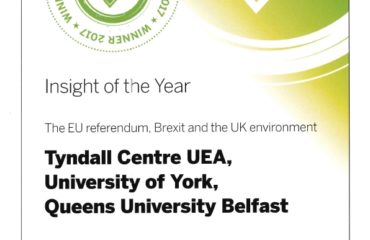Experts agree: EU membership is good for Britain’s natural environment

A pro-EU leaflet recently issued by the UK government caused controversy over the use of public funds for a political campaign. But even more scandalous was the fact that the leaflet made only one passing mention of climate change and none of wider environmental policy. The prime minister’s reform mandate was also notably quiet on the subject.
We should therefore welcome the latest report by the cross-party group of MPs who sit on parliament’s environmental audit committee (EAC). Their report on EU and UK environmental policy will do much to inform the debate on the June 23 EU membership referendum.
The environmental benefits of EU membership should be front and centre of any remain campaign: there’s widespread acceptance among experts that the union makes a huge difference. The UK was known as the dirty man of Europe in the 1970s and 80s and the EU is widely credited with helping clean up the national environment.
The EAC report is the third to be published since March reviewing the implications of the referendum for the UK’s environment, with all broadly similar in their conclusions. The Institute for European Environmental Policy think tank argued that the EU has been good for the UK’s environment and expressed concern over the prospects for habitats and birds in the event of a Brexit. A group of independent academic experts, including myself, also launched a report in April which, while not advocating a position, highlighted the risks of leaving the EU and suggested that on balance membership has been beneficial for the UK. The latest EAC report is similarly positive.
So there exists a near-consensus on the value of EU membership across relevant environmental experts in academia, NGOs and parliament. But this does not necessarily reflect wider opinion among the political classes: there is no better indication of this than the fact that one member of the EAC, leading eurosceptic Peter Lilley, insisted that a dissenting report expressing his views be appended to the main document.
The calls from the Conservative backbenches for a bonfire of red tape have also often had EU environmental regulations in their sights, and a recent blog in the Economist even suggested that climate scepticism often goes hand-in-hand with euro-scepticism.
It seems unlikely then that environmental arguments are going to change the mind of hardened eurosceptics. However these reports may provide food for thought for those who are more uncertain about their voting intentions.
Big problems, big solutions
One clear finding emerging across the reports is that environmental policy benefits from transnational governance arrangements: pollution does not respect national borders and therefore mitigation of environmental problems requires cooperation across and between states. The EU provides a vehicle for such cooperation.
Dealing with environmental issues also requires clear targets and deadlines. The EU requires its members to set clear policies with strong enforcement mechanisms, which UK citizens can rely upon. For example, the UK government is currently facing legal action over failing to meet European air quality standards.
EU policy also provides a degree of long term stability, and a more certain investment climate for the infrastructural development required to boost renewable energy or to secure better water quality through projects such as the Thames Tideway tunnel.
Finally the EAC report notes the degree of scepticism among those giving evidence that a UK government acting independently would maintain the same level of protection for the environment as that provided currently by the EU. Lilley picks up on the same point but is clearly more sanguine than his colleagues on the committee about the prospects of a UK outside the EU maintaining similar standards of protection.




